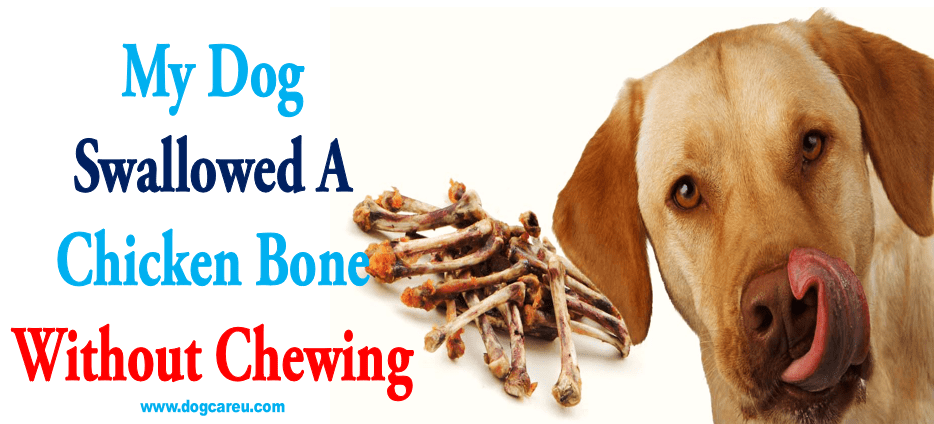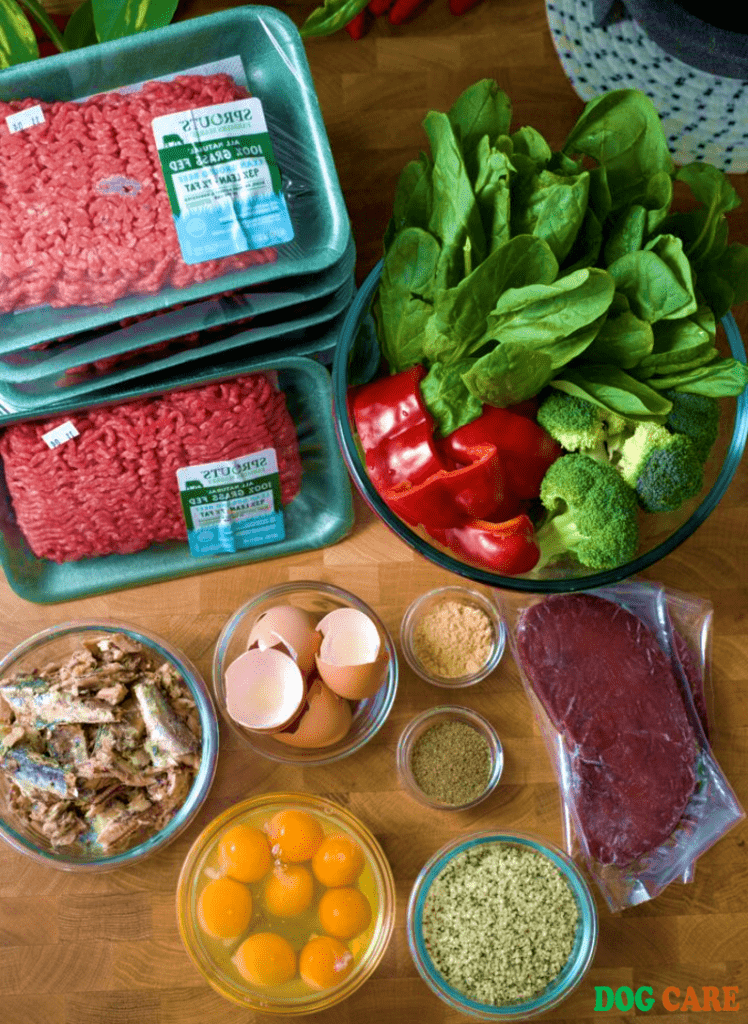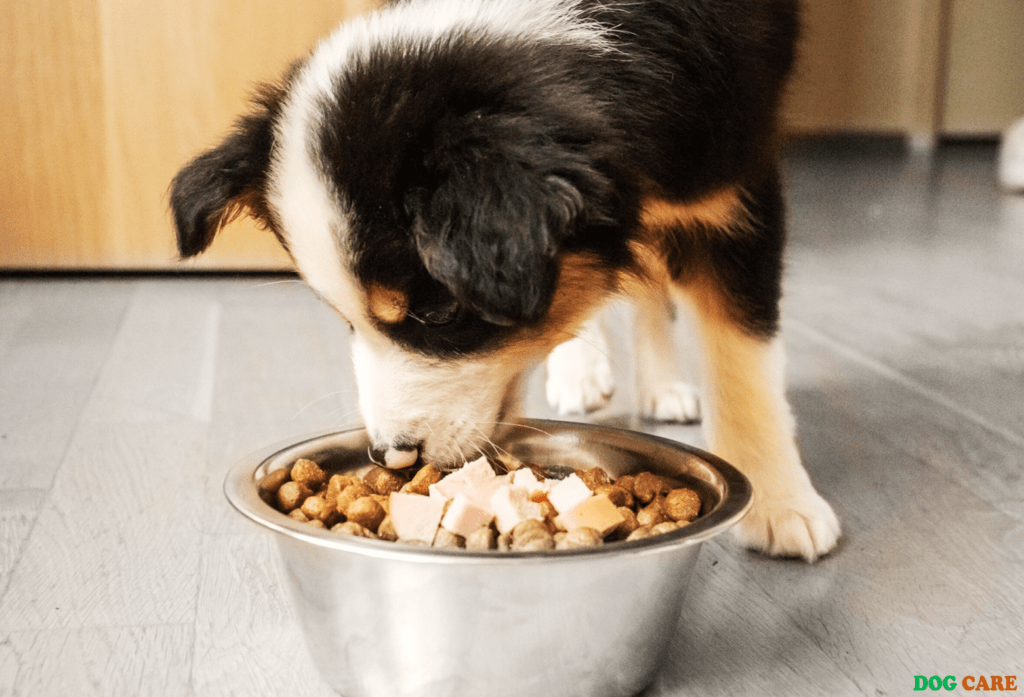My Dog Swallowed a Chicken Bone Without Chewing, it is important to seek immediate veterinary attention. This article provides information on how to handle this situation and prevent any potential complications.
Introducing foreign objects into their digestive system can be dangerous for dogs. When it comes to chicken bones, their splintered nature poses a significant risk. If your dog has swallowed a chicken bone without chewing, it is crucial to take action promptly.
While the digestive juices in their stomach may break down some parts of the bone, there is still a possibility of it causing an obstruction or puncturing the intestines. We will explore the steps you should take if your dog has ingested a chicken bone and highlight the potential risks associated with this situation. Be sure to read on for essential guidance to help keep your furry friend safe and healthy.

The Danger Of Swallowing Chicken Bones
Swallowing chicken bones can pose serious risks to dogs, as the bones may splinter and cause internal damage. In such cases, immediate veterinary attention is crucial to prevent potential injuries and complications. It’s important to monitor your dog closely and seek professional help if they have ingested a chicken bone without chewing.
Risks Of Swallowing Bones
When it comes to dogs, curiosity often leads them into trouble. One of the most common mishaps is swallowing chicken bones without chewing. While it may seem harmless, the danger of this action should not be underestimated.
Internal Damage Caused By Bones
Swallowing chicken bones can put your dog at risk of serious internal damage. The sharp edges of the bones can scrape and puncture the delicate lining of the esophagus, stomach, and intestines. This can result in painful wounds, internal bleeding, and even infection.
Moreover, the risk of bone splintering increases if the bone wasn’t chewed properly. Splintered bones can cause further harm as they can become lodged in the throat or puncture organs, leading to life-threatening complications.
Telltale Signs Of A Problem
It’s important to know the warning signs that your dog may have swallowed a bone. If you notice any of the following symptoms, it’s crucial to seek immediate veterinary attention:
- Vomiting
- Diarrhea
- Lethargy
- Loss of appetite
- Abdominal pain or bloating
Steps To Take
If you suspect your dog has swallowed a chicken bone, it’s important to act swiftly. Here are some steps you can take:
- Do not induce vomiting – chicken bones can cause further damage as they come back up.
- Call your veterinarian immediately for guidance and seek prompt professional advice.
- Observe your dog closely for any changes in behavior or symptoms of distress.
- Follow your veterinarian’s instructions, which may include monitoring at home or a visit to the clinic for examination and potential treatment.
In conclusion, the danger of your dog swallowing chicken bones without chewing is real. It’s essential to recognize the risks and take immediate action if you suspect this has happened. Remember, the health and safety of your furry friend should always be a top priority!
Warning Signs And Symptoms
It’s a pet owner’s worst nightmare – your beloved dog has swallowed a chicken bone without even chewing it. Now, you’re worried about potential complications and how to ensure your furry friend stays healthy. Knowing the warning signs and symptoms to watch out for is crucial in these situations. It’s important to act promptly and take immediate actions to mitigate any risks.
Symptoms To Watch For
When your dog swallows a chicken bone without chewing, there are a few key symptoms you should keep an eye out for. These indicators can help you determine whether your dog needs immediate attention or not:
- Choking or gagging: If your dog is choking or gagging, it’s an immediate red flag. This can indicate that the bone has become lodged in their throat or is causing discomfort.
- Excessive drooling: Excessive drooling can suggest that your dog is experiencing pain or irritation in their throat or digestive tract.
- Loss of appetite: If your dog suddenly loses interest in eating, it could be a sign that the bone has caused internal damage or an obstruction.
- Vomiting: Frequent vomiting or unproductive attempts to vomit may indicate that the bone is causing an obstruction in your dog’s digestive system.
- Abdominal pain: Your dog may display signs of discomfort or tenderness in their abdomen, often accompanied by restlessness or pacing.
Immediate Actions To Take
If you notice any of the above symptoms or suspect that your dog has swallowed a bone without chewing it, taking immediate actions is crucial to prevent further complications.
- Do not induce vomiting: Contrary to popular belief, inducing vomiting can actually pose a greater risk of injury if the bone becomes lodged.
- Contact your veterinarian: Reach out to your veterinarian immediately for professional advice and guidance tailored to your dog’s specific situation.
- Monitor your dog: Keep a close eye on your dog’s behavior and note any changes or worsening of symptoms. This information will be vital for your veterinarian’s evaluation.
- Restrict food and water: Limit your dog’s access to food and water until you receive guidance from your veterinarian. This will help minimize potential irritation or movement of the bone.
- Avoid self-medication: It’s essential to refrain from giving your dog any medications without veterinary approval, as some remedies can worsen the situation or interact negatively with treatment.
Remember, every situation can vary, and the severity of risks can differ depending on various factors such as the size of the bone and your dog’s size and health. Seek professional veterinary assistance as soon as possible to ensure the best outcome for your furry companion.
Seeking Veterinary Care
Seeking Veterinary Care is crucial if your dog has swallowed a chicken bone without chewing. It’s important to act quickly to ensure the safety and health of your furry friend. Here’s what you need to know about getting the right care for your pet.
Emergency Vet Care
If your dog has swallowed a chicken bone without chewing, it’s essential to seek emergency veterinary care immediately. Contact your nearest veterinary hospital or animal emergency clinic and inform them of the situation. Have transportation ready for your dog and follow their instructions closely. Time is of the essence in these situations.
X-rays And Examination
Once you arrive at the veterinary clinic, the vet will likely conduct a thorough examination of your dog. This may include palpating the abdomen and possibly performing x-rays to determine the location and potential damage caused by the swallowed bone. The x-rays will help the vet assess if the bone has become lodged or if there are any signs of internal injuries.
Treatment Options
When your dog has swallowed a chicken bone without chewing, it’s important to act quickly to ensure their safety and well-being. There are several treatment options available that you can consider based on the severity of the situation. These include surgical intervention and the recovery process.
Surgical Intervention:
If your dog has ingested a chicken bone and experiences complications such as an obstruction or perforation in the digestive tract, surgical intervention may be necessary. During this procedure, a veterinarian will locate and remove the bone to prevent further harm to your furry friend.
Surgical intervention is typically carried out under general anesthesia, ensuring that your dog remains comfortable throughout the process. The veterinarian will make an incision in the abdominal area to access the digestive tract. Once the bone is located, it will be carefully extracted to prevent any further damage. After the surgery, your dog will require close monitoring as they recover from the procedure.
Recovery Process:
The recovery process after surgical intervention is crucial for your dog’s well-being. It’s essential to follow the veterinarian’s instructions carefully to ensure a smooth and successful recovery.
Here are some important aspects to keep in mind during the recovery process:
- Postoperative Care: Your dog may require pain medication and antibiotics to manage discomfort and prevent infection. Administer these medications as directed by your veterinarian.
- Dietary Modifications: Your dog’s diet may need to be adjusted to aid in their recovery. Your veterinarian may recommend a soft or liquid diet to ease digestion and prevent further complications. It’s essential to adhere to the prescribed diet strictly.
- Restricted Activity: Your dog may need to avoid vigorous exercise and play during the recovery period to prevent any strain on their digestive tract.
- Regular Follow-up Visits: It’s crucial to schedule and attend regular follow-up visits with your veterinarian. These visits allow the vet to monitor your dog’s progress and address any concerns or complications that may arise.
Remember, the recovery process takes time, and patience is key. Ensuring a comfortable and stress-free environment for your dog will aid in their healing process. If you notice any unusual symptoms or signs of discomfort during the recovery period, reach out to your veterinarian immediately for guidance.
Prevention And Safety Measures
When your dog swallows a chicken bone without chewing, it’s important to take immediate prevention and safety measures. Contact your veterinarian for advice on how to proceed and ensure the safety and health of your beloved pet.
My Dog Swallowed a Chicken Bone Without Chewing can be a scary situation for dog owners. However, taking preventive measures and implementing safety protocols can help avoid such incidents. Here are some important measures to follow:
Keeping Bones Away
One of the most effective ways to prevent your dog from swallowing chicken bones is to keep them out of reach. Dogs are notorious for rummaging through trash cans or scavenging for food left unattended. Ensure that any leftover chicken bones are disposed of properly, in a sealed trash can that your dog cannot access. It’s also important to teach your dog commands such as “leave it” or “drop it” to discourage them from picking up bones or other potentially harmful objects.
Safe Chew Alternatives
To satisfy your dog’s instinct to chew, it’s important to provide safe and appropriate chew toys or alternatives. Opt for toys that are specifically designed for dogs and are made of non-toxic and durable materials. Bully sticks, rubber toys, or specially designed-dental chews are good options. Avoid giving your dog bones from cooked chicken or other poultry, as these can splinter easily and pose a choking or digestive risk.
Supervision And Training
Supervising your dog while they are chewing on bones or toys is crucial, especially if your furry friend has a history of swallowing items without chewing. By keeping a watchful eye, you can intervene if your dog shows signs of swallowing a bone whole or struggling with a piece. Additionally, providing proper training and obedience commands can also help prevent such incidents. Regular training sessions and reinforcing good behavior can make a significant difference in keeping your pup safe.
In conclusion, implementing prevention and safety measures is essential to reduce the risk of your dog swallowing a chicken bone without chewing. By keeping bones away, providing safe alternatives, and actively supervising your dog during chew time, you can ensure their safety and well-being. Remember, it’s always better to be proactive and prevent such incidents than to deal with the potential consequences later on.
Frequently Asked Questions Of My Dog Swallowed A Chicken Bone Without Chewing
Will My Dog Be Ok If He Swallowed A Chicken Bone?
If your dog swallowed a chicken bone, it can be dangerous. Contact your veterinarian immediately for advice.
How Long Does It Take For A Chicken Bone To Dissolve In A Dog’s Stomach?
It can take several days for a chicken bone to dissolve in a dog’s stomach. However, there is a risk of it causing blockages or perforations which may require a trip to the vet. Always supervise your dog with bones.
What Happens If A Dog Swallows A Bone Without Chewing?
Swallowing a bone without chewing can cause serious health issues for dogs. It may get stuck in the throat, stomach or intestines, leading to choking, blockage or tearing. In such cases, immediate veterinary attention is crucial to remove the bone safely and prevent further complications.
How Long Should I Monitor My Dog After Eating Chicken Bones?
Monitor your dog for at least 24 hours after they have eaten chicken bones. Look for signs of discomfort, such as vomiting, diarrhea, or difficulty breathing. Contact your vet if you notice any concerning symptoms. Keep a close eye on your furry friend to ensure their safety and well-being.
Conclusion
It’s essential to stay calm if your dog swallows a chicken bone without chewing. Keep an eye on their behavior and monitor for any signs of distress. Contact your vet immediately for guidance and follow their instructions. Remember, prevention is key, so be mindful of what your dog has access to.


